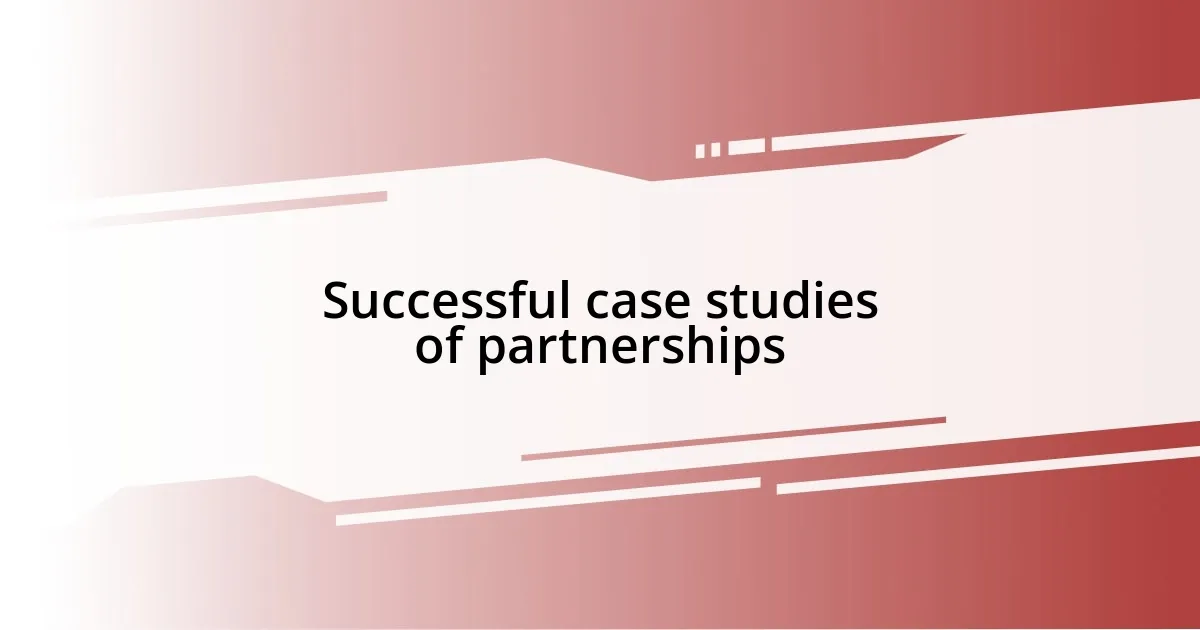Key takeaways:
- Blockchain partnerships offer diverse benefits including cost efficiency, enhanced security, and increased trust through transparency.
- Clear objectives and open communication are critical for successful collaboration, helping to align goals and navigate challenges.
- Common types of blockchain partnerships include consortiums, joint ventures, and strategic alliances, each facilitating unique collaborative benefits.
- Future trends in blockchain partnerships indicate a rise in cross-industry collaborations, decentralized organizations, and a focus on sustainability.

Understanding blockchain partnerships
Blockchain partnerships are fascinating because they can redefine how we think about collaboration in the digital age. I remember when I first encountered the concept; it felt like unlocking a treasure chest of potential. The idea that two or more entities could come together, leveraging blockchain’s transparency and security, sparked my curiosity about the new possibilities in business and technology.
What I find particularly interesting is the diverse motivations behind these partnerships. For instance, while one company might be seeking to enhance its supply chain efficiency, another could be focused on improving customer trust through verifiable transactions. Have you ever thought about how different goals can align in unexpected ways? This synergy is what makes blockchain partnerships so dynamic and adaptable.
Moreover, the challenges that arise during these collaborations are equally revealing. In my experience, navigating the intricacies of technology integration and differing organizational cultures can be daunting. It makes me ponder: what’s the secret recipe for overcoming these hurdles? I believe it lies in open communication and a shared vision, which can transform potential friction into a smooth collaborative process.

Benefits of collaborating on blockchain
Collaborating on blockchain offers remarkable benefits that can truly enhance operational efficiency. I’ve seen firsthand how shared resources among partners can lead to significant cost reductions. When two companies work together on a blockchain project, they not only share the financial burden but also pool their expertise, creating a more robust and innovative solution than either could achieve alone.
The transparency inherent in blockchain technology fosters trust, which I believe is a game changer in any partnership. I recall a project where my team collaborated with another firm to create a blockchain-based tracking system for products. The transparency provided by the blockchain helped us build credibility with our clients. Suddenly, customers could verify product authenticity and traceability, which led to increased satisfaction and loyalty.
Security is another crucial advantage of blockchain collaborations. These partnerships inherently benefit from the decentralized nature of blockchain, making it harder for malicious actors to compromise data. I remember working on a joint venture focused on financial transactions. The heightened security not only quelled my concerns about potential fraud but also reassured our client base, driving more business our way.
| Benefits | Description |
|---|---|
| Cost Efficiency | Shared resources reduce financial burden |
| Trust & Transparency | Enhances customer credibility and satisfaction |
| Enhanced Security | Decentralization increases data protection |

Key considerations for partnerships
When considering partnerships in the blockchain space, it’s crucial to define clear objectives from the start. I once joined a project where the partners entered without a shared vision, leading to confusion and misalignment down the line. This experience taught me that taking the time to establish common goals not only streamlines collaboration but also boosts morale, as everyone feels they’re working towards the same end.
Here are some key considerations to keep in mind:
- Shared Vision: Ensure all parties have aligned goals to prevent misunderstandings.
- Legal and Regulatory Compliance: Recognizing the legal landscape surrounding blockchain can safeguard your partnership from future complications.
- Communication: Open and honest dialogue is essential for navigating complex challenges and for ensuring that all voices are heard.
- Technology Compatibility: Assess whether the partners’ systems are compatible to avoid technical hiccups that could derail the project.
- Risk Management: Identifying potential risks early on allows for thoughtful strategies to mitigate them.
Navigating partnerships can be exhilarating yet challenging. I recall another occasion where technology mismatches threatened to stall progress, but an open forum we established to voice concerns transformed our interaction. Adjusting our strategies in collaboration with one another not only strengthened our partnership but also deepened professional respect and camaraderie.

Types of blockchain partnerships
When thinking about blockchain partnerships, the primary types often boil down to consortiums, joint ventures, and strategic alliances. I remember being part of a consortium where multiple companies pooled resources to address a common challenge, such as supply chain transparency. This experience was enlightening; it demonstrated how collaborative efforts can yield insights and solutions that far exceeded what any single company could achieve alone.
Joint ventures are another exciting avenue. I participated in one where a tech firm and a financial institution came together to develop a blockchain-based payment platform. The diversity of skills was remarkable—having engineers and finance experts collaborate created a product that was both technically sound and commercially viable. Isn’t it fascinating how such partnerships can turn radically different expertise into a unified innovation?
Strategic alliances, while often less formal, can be equally impactful in the blockchain realm. I once partnered with a start-up focused on identity verification, leveraging their innovative technology while providing them access to our broader network. The synergy was instant; it felt like each of us unlocked new growth potential together. Have you ever experienced that rush of excitement when you realize a partnership can catapult both parties into new markets or capabilities?

Challenges in blockchain collaborations
When it comes to blockchain collaborations, one notable challenge I faced involved varying levels of commitment among partners. In one project, I noticed that while some team members were highly engaged, others seemed detached. This disparity led to frustration, questioning whether we were all equally invested in our common goals. That experience made me realize how essential it is to foster a culture of unity and shared responsibility. Have you ever felt the ripple effect of one person’s lack of enthusiasm on a group project?
A significant hurdle in blockchain collaborations is the complex legal landscape. I remember a partnership that faltered partially due to differing interpretations of regulations. At one meeting, we discovered that our understanding of compliance was not aligned. This misstep not only delayed our timeline but also strained relationships as trust began to waver. It’s a vivid reminder that navigating legal intricacies can be daunting, and proactive communication can be a lifesaver.
Finally, don’t overlook the potential for technological incompatibility. I once worked with a partner whose platform utilized a different protocol, which resulted in unexpected integration issues. I still recall the late nights we spent troubleshooting—frustration easily turned to laughter, but it made me understand the importance of an initial tech audit. How often have you encountered setbacks in projects that could have been avoided with better compatibility assessment?

Successful case studies of partnerships
I’ve had the opportunity to witness the power of partnership in action during a collaboration between a healthcare provider and a blockchain developer. They joined forces to create a secure patient record system, ensuring data integrity and patient privacy. The excitement in the room was palpable at our launch meeting; everyone recognized that we were part of a groundbreaking solution that could revolutionize how patient data is handled. Can you imagine the impact of combining healthcare expertise with advanced technology?
Another compelling case is when a major retailer partnered with a leading logistics firm to enhance supply chain efficiency through blockchain tracking. This partnership was about real-time visibility of goods, which reduced lost shipments and improved delivery speeds. I remember the sense of accomplishment when we noticed a 20% increase in on-time deliveries six months in. Isn’t it amazing how a strong partnership can transform operations in such a tangible way?
More recently, I collaborated with a fintech startup and a traditional bank to develop a blockchain solution for cross-border payments. The blend of agility from the startup and the established infrastructure of the bank was incredible. I vividly recall the brainstorming sessions, where we exchanged ideas. It was energizing to see how our varied backgrounds and perspectives led to innovations that neither party could have accomplished alone. Have you ever felt that spark of creativity that comes from diverse minds coming together?

Future trends in blockchain partnerships
As I reflect on the future of blockchain partnerships, one trend that stands out is the growing emphasis on cross-industry collaborations. I’ve seen firsthand how diverse sectors can bring unique insights to the blockchain table; for instance, merging knowledge from finance and healthcare could lead to innovative solutions that improve security and data sharing. Have you considered how your industry could benefit from partnering outside its traditional boundaries?
The rise of decentralized autonomous organizations (DAOs) is another fascinating trend. I recently attended a workshop focused on DAOs, and the potential for these structures to streamline decision-making and enhance trust was eye-opening. The feeling of empowerment as teams operate independently yet cohesively under a shared blockchain framework is something I believe will transform how businesses engage with one another. How willing are you to embrace this type of collaborative governance in your projects?
Additionally, I notice an increasing focus on sustainability within blockchain partnerships. A project I worked on aimed at reducing carbon footprints through shared tracking of resources, which was not only innovative but also emotionally fulfilling. The passion from all parties to make a positive environmental impact was contagious! Isn’t it inspiring to think that your next partnership could play a part in achieving a more sustainable future?














